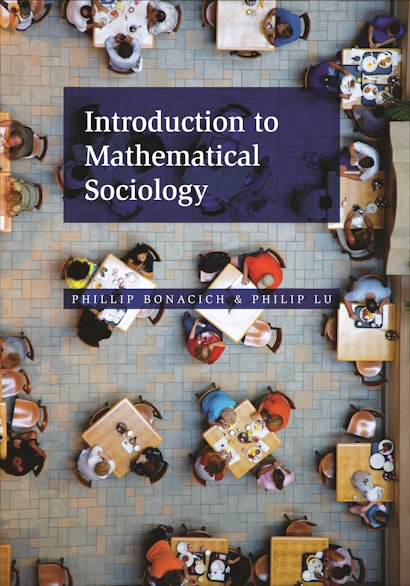Mathematical models and computer simulations of complex social systems have become everyday tools in sociology. Yet until now, students had no up-to-date textbook from which to learn these techniques. Introduction to Mathematical Sociology fills this gap, providing undergraduates with a comprehensive, self-contained primer on the mathematical tools and applications that sociologists use to understand social behavior.
Phillip Bonacich and Philip Lu cover all the essential mathematics, including linear algebra, graph theory, set theory, game theory, and probability. They show how to apply these mathematical tools to demography; patterns of power, influence, and friendship in social networks; Markov chains; the evolution and stability of cooperation in human groups; chaotic and complex systems; and more.
Introduction to Mathematical Sociology also features numerous exercises throughout, and is accompanied by easy-to-use Mathematica-based computer simulations that students can use to examine the effects of changing parameters on model behavior.
- Provides an up-to-date and self-contained introduction to mathematical sociology
- Explains essential mathematical tools and their applications
- Includes numerous exercises throughout
- Features easy-to-use computer simulations to help students master concepts
Phillip Bonacich is professor emeritus of sociology at the University of California, Los Angeles. Philip Lu is a PhD candidate in sociology at UCLA.
"[T]he volume offers certain important building blocks that can represent a bonus for students willing to learn simulation in the future. . . . Bonacich and Lu's work brillantly introduces much of what ABM students will be requested to know in their subsequent studies."—Giangiacomo Bravo, JASSS
"If you are interested in sociology specifically, or in some of the others social sciences (especially political science), then this book is a very good introduction for you. . . . I would certainly recommend it to students and others who have some mathematical maturity and are interested in mathematical sociology, mathematical political science, or mathematical psychology."—JamesM. Cargal, UMAP Journal
"A first-rate introduction. The coverage is exemplary, starting with basic math techniques and progressing to models that incorporate a number of these techniques. Chapters on evolutionary game theory, cooperative games, and chaos are significantly innovative, as is the incorporation of simulations. This book brings mathematics to life for students who may entertain doubts about the role of math in sociology."—Peter Abell, professor emeritus, London School of Economics and Political Science
"This book provides a concise and up-to-date introduction to mathematical sociology and social network analysis. It presents a solid platform for engaging undergraduates in mathematical approaches to sociological inquiry, and includes Mathematica modules with which students can explore the properties and implications of a variety of formal models. I plan on using it in my courses on social networks."—Noah E. Friedkin, coauthor of Social Influence Network Theory: A Sociological Examination of Small Group Dynamics

